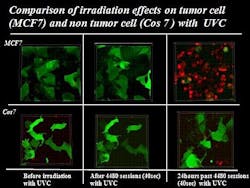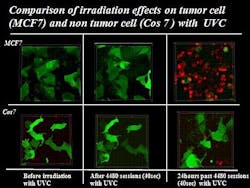Cancer therapy method uses UVC pulse flash irradiation to destroy neoplastic cells
Scientists at the Tokai University School of Medicine (Isehara, Japan) have developed a new cancer therapy method using ultraviolet C (UVC) pulses of light.
The work, led by Johbu Itoh, employs high-intensity UVC pulse flash rays (UVCPFRs) of a broad UVC spectrum (230â280 nm) produced by a modified UV-flash sterilization system. Their experiments showed that the pulsed nature of the spectrum enhances the efficiency of destroying neoplastic cells. Under the appropriate UVC irradiation conditions only neoplastic cell were destroyed, and non-neoplastic cells did not reach conditions of cell death.
Sterilization effects of UVCPFRs show promise as a more efficient and rapid means of destroying a wider range of bacteria because this type of irradiation produces light whose energy is tens of thousands of times greater for a given area of irradiation, compared with conventional UV lamps (65 W equivalency).
The researchers irradiated cells with UVCPFRs at 1â10 continuous flashes per second to produce cell injury or functional obstruction only to the neoplastic cells. Higher UV radiation sensitivity in the UVC range was observed in neoplastic cells compared to non-neoplastic cells, so a short burst of UV radiation was sufficient enough to selectively induce injury and death to neoplastic cells.
Furthermore, their experiments showed that UVCPFRs caused cell death within a few seconds. Itoh and colleagues plan to develop this system for cancer treatment using endoscopy, laser microscopy, and other such light irradiation equipment.
Itoh will describe details of the findings at the International Congress of Histochemistry and Cytochemistry (ICHC 2012; http://www.acplan.jp/ichc2012/), to take place August 26â29 in Kyoto, Japan.
-----
Follow us on Twitter, 'like' us on Facebook, and join our group on LinkedIn
Laser Focus World has gone mobile: Get all of the mobile-friendly options here.
Subscribe now to BioOptics World magazine; it's free!

